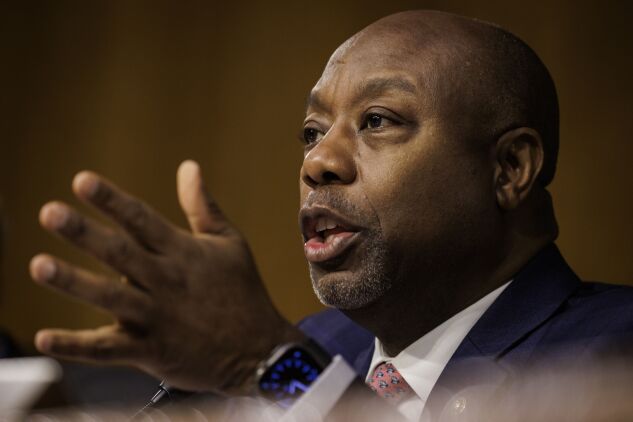A big-money lobbying fight on Capitol Hill is pitting banks against the fast-rising crypto industry with potentially trillions of dollars at stake.
The dispute centers on whether cryptocurrency exchanges should be allowed to offer financial incentives—similar to interest—to those keeping their digital assets with them. Banks are urging lawmakers to broaden an existing ban on stablecoin interest payments in an upcoming regulatory bill. Otherwise, banks argue, their ability to make loans could be in peril, while the crypto industry argues its future innovation hangs in the balance.
An April Treasury Department report estimated that up to $6.6 trillion in deposits could flow from banks to stablecoins depending on whether they can pay interest to users. The dispute has led to a slew of online ads and generated more than 320,000 messages to Senate offices in recent weeks.
“This is an issue that affects crypto voters and the average American very personally and, because of that, it really struck a chord,” said Mason Lynaugh, community director at Stand With Crypto, an industry-allied group. Stand With Crypto has tracked the messages to Senate offices, he said.
Under the recently enacted GENIUS Act (PL 119-27, see BGOV Bill Analysis), issuers of stablecoins—digital assets designed to match the value of the US dollar and other currencies—can’t pay interest to stablecoin holders or users. But the ban, which banks lobbied for, doesn’t apply to crypto exchanges, such as Coinbase, issuers’ affiliates, or other third parties and banks see that as a loophole.
“We’re very worried about interest, rewards, yields—call it whatever you want—impeding banks’ ability to serve their communities through loans,” said Brooke Ybarra, senior vice president of innovation and strategy at the American Bankers Association.
Banks want to expand the ban on stablecoin interest in a pending crypto market structure bill (H.R. 3633; Bill Analysis).
Ad Campaign
The crypto industry’s recent ad campaign accuses banks of seeking a “bailout” and anti-competitive measures. A coalition of crypto companies and industry groups is urging users to tell senators to reject the bank-led effort, warning big banks are “coming after your crypto rewards.”
Major crypto exchanges currently offer rewards for stablecoin holders. For example, Coinbase offers a 4.1% interest rate to hold USDC, which is tethered to the US dollar.
Ybarra called the ads “pretty misleading.”
“We’re not trying to re-litigate something,” Ybarra said. “This is the next part of the conversation, and we think it’s totally appropriate to have this debate as part of the market structure legislation, especially when you consider the risks to economic growth and financial stability.”
Coinbase Inc., the Blockchain Association, and the Crypto Council for Innovation were among the players that pushed Congress earlier this year to enact the first major crypto law and have been pushing against the banks on the rewards. Coinbase spent $2.9 million for federal lobbying in the first three quarters of this year, putting it on pace to be among its biggest-spending year.
“Stablecoin rewards are good incentives for customers who choose to use certain platforms and take part in that innovation,” said Rashan Colbert, the Crypto Council’s director of US federal policy, in an email.
Kara Calvert, in-house lobbyist at Coinbase, said, in her view, it seems that banks are “not happy with the deal they made in the GENIUS Act, and they want a do over.”
Legislative Wrangling
Draft text of the Senate panel’s bill obtained by Bloomberg last month didn’t include the ban advocated by banks.
The bank-versus-crypto debate is the latest roadblock stalling progress on the market structure bill. Senate Banking Chairman
A group of crypto-friendly Democrats needed to get 60 votes in the Senate want stricter rules to prevent illicit crypto activity. Senate Democrats are set to meet with crypto executives Wednesday.
Sen.
“The banking community needs to be heard on this issue,” Kennedy said.
The House passed its own market structure bill in July. Nearly 80 Democrats voted for the GOP-led bill, but the Senate hasn’t taken it up. The House-passed bill would make amendments to GENIUS, including by restricting non-financial companies such as Big Tech firms from acquiring stablecoin issuers, but wouldn’t modify the existing ban on interest payments.
The crypto-friendly White House is pushing Congress to enact the second crypto law by the end of the year.
“This whole year, every single week, we’ve seen a movement forward, sometimes inches, sometimes feet,” Calvert said of the market structure measure. “They are tackling really meaty issues.”
Political Force
Crypto companies and executives poured millions into the 2024 elections, emerging as a political force for the first time. Fairshake, an industry super PAC, raised more than $260 million and spent in excess of $125 million on electioneering in the 2024 election cycle, its first in existence, federal campaign records show.
Some of crypto’s biggest recipients are members of the Banking panel’s digital assets subcommittee, which is working out details of the legislation.
The industry spent $40 million backing Bernie Moreno (R-Ohio), who unseated former chairman Sherrod Brown, and $10 million supporting Sen. Ruben Gallego (D-Ariz.), the top Democrat on the subcommittee.
With an eye on next year’s midterm races, Fairshake had almost $120 million on hand as of June 30, according to Federal Election Commission reports.
In a sign of the battle lines, the Club for Growth, a player in GOP politics and policy issues, led a recent letter to senators coming down on the crypto side. The bank-sought provision would “destroy the economics of adoption,” the club and conservative groups wrote.
To contact the reporters on this story:
To contact the editors responsible for this story:



